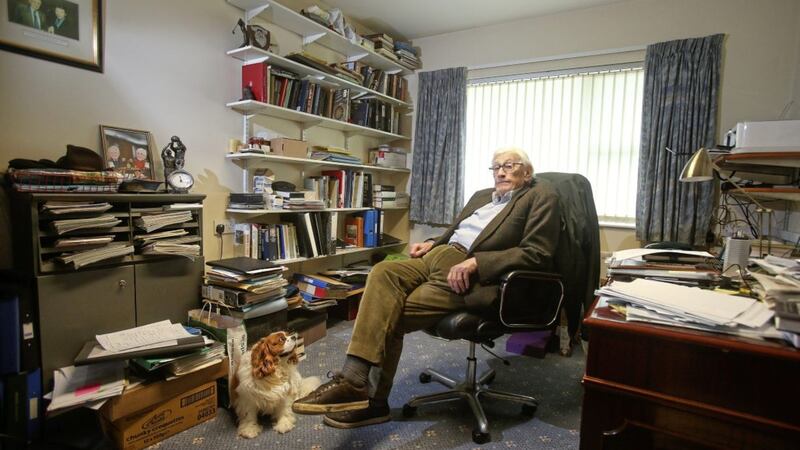SMALL wonder the question of the border jumped up and bit British politics. How Protestants would take changes to the administration of Northern Ireland, much less its definition, is the default underpinning of British government thinking.
The NI problem, more honestly expressed as problematic Ulster Protestants, has been marked 'best left alone' to be periodically exploited with marked disdain.
Now we're headed for post-Theresa May dickering, the DUP openly voicing anger.
Tony Blair at his best broke with London caution and challenged unionism.
In the run-up to this week's election, an old player's comments on Blair and others have won attention on the back of his newly-published personal and political memoir.
Seamus Mallon's dictum that 50 per cent plus one will not do is a blast from the past in a surprising way, reminiscent to this writer of nobody so much as Oliver Napier.
Although surely the younger Mallon did not enormously respect Napier, the Alliance founder-member, nor share the anxiety he felt so keenly that Catholic demands would anger Protestants to a degree dangerous to Catholics.
It was always one of Mallon's strengths that he said his piece without undue politesse and sounded fearless.
It was what audiences loved about him, but his feelings about the making of peace remain conflicted.
The war of succession has been bitter for the SDLP. Loathing for Sinn Féin may be chiselled in the Mallon heart, and here they are, pushing second preferences for Naomi Long over Colum Eastwood. Desire to destroy the SDLP is more in play than admiration for the doughty Alliance leader.
The DUP have been telling their people, meanwhile, to forget the NI Remain vote, the referendum was a British vote.
Only transfers to unionists can secure the union. Anger about badly-negotiated Brexit is natural, proper.
Experience suggests that British fear of Protestant wrath is a theory more entertained by Catholics than Protestants. Though disillusioned Protestants will occasionally raise it in private conversation.
Some even regret, bitterly, how willing their community's supposed leaders are to entrench British timorousness, to confirm that London, and indeed Dublin, are right to be terrified into inaction, or delay, or dilution, by the merest whiff of unionist/loyalist/Protestant unrest turning into something more solid.
One reason so few Protestants speak out is that the sky falls in on them when they do.
Or they find themselves outcast, a humorous lament of Fair Employment champion Bob Cooper, another early Alliance member, indeed first joint chairman of the party with Napier.
At best those who spoke up for fairness were regarded as harmless eccentrics, more often spurned, at worst eliminated; loyalists killed John Turnley. John Robb was a lifelong proponent of a new Ireland, and a loner.
Catholics have preferred to call such unusual beings 'good Protestants, decent Protestants'.
That originally came from a people self-pitying with good enough reason but surely hard to like all the same; almost as dislikeable as the Protestant community living alongside them but not on equal terms; ingrown. (John Hume's original drive was to coax Catholics into participation.)
Implicit in the tags of 'good' and 'decent Protestants' was that Catholics of course were both these things.
Indecencies were not to be admitted. That would give scandal to the other side. Rack-renting Catholic landlords, bosses who paid pitiful wages, a Church that was paternalistic in its best priests and on the surface, abusive perhaps in swathes across a predominantly poor, cowed community.
What people clung to was a solidarity more notional than real. Priest, teacher ('the Master'), doctor, all men, some good enough, some in it for their own glory, wielded rods of dogma as well as benevolence.
Living conditions varied widely. In the bigger Protestant community, how different was it for people at the bottom?
Mallon says nationalists should be generous now; better than unionists have ever been.
It would do Protestants a power of good, for their own self-esteem, to be a lot better. Instead of fighting a rearguard on 'legacy' and hashing over the origin of the Troubles, their intellectuals might confront the daft bigots and sell-out merchants, wizened wizards of Oz. No matter how he polls on Thursday, Jim Allister will still be a one-man band.
And no matter about Sinn Féin sloganeering, and battle-hardened Mallon fears, a border poll is not about to crash across the horizon.
It will be another 'process'. Liberal views will grow. Orthodox Protestantism is under as much pressure as Catholicism. Time for the less good to wise up, and for the good to be better.








